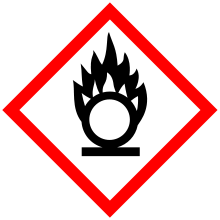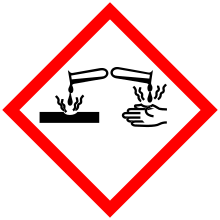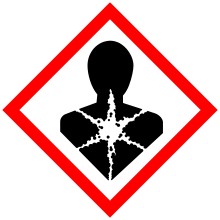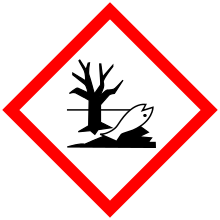Ammonium chromate
| | |
| Names | |
|---|---|
| Other names
Ammonium chromate(IV) | |
| Identifiers | |
| 7788-98-9 | |
| ChemSpider | 22997 |
| ECHA InfoCard | 100.029.217 |
| Properties | |
| (NH4)2CrO4 | |
| Molar mass | 152.07 g/mol |
| Appearance | yellow crystals |
| Density | 1.90 g/ml |
| Melting point | 185 °C (365 °F; 458 K) decomposes[1] |
| 24.8 g/100ml (0 °C) 37.36 g/100ml (25 °C)[1] 45.3 g/100ml (40 °C) 70.06 g/100ml (75 °C)[1][2] | |
| Thermochemistry | |
| Std molar entropy (S |
657 J/K·mol |
| Std enthalpy of formation (ΔfH |
-1163 kJ/mol |
| Hazards | |
| Main hazards | Toxic |
| GHS pictograms |     [3] [3] |
| GHS signal word | Danger |
| H272, H314, H334, H350, H400[3] | |
| P201, P220, P261, P273, P280, P305+351+338[3] | |
| EU classification (DSD) |
|
| R-phrases | R8, R34, R43, R49, R50/53 |
| S-phrases | S17, S26, S36/37/39, S45, S53, S60, S61 |
| Except where otherwise noted, data are given for materials in their standard state (at 25 °C [77 °F], 100 kPa). | |
| Infobox references | |
Ammonium chromate is a salt with the formula (NH4)2CrO4. It forms yellow, monoclinic crystals; made from ammonium hydroxide and ammonium dichromate; used in photography as a sensitizer for gelatin coatings. It's often used in photography, textile printing, and fixing chromate dyes on wool. It is also used as an analytical reagent, catalyst, and corrosion inhibitor. It is soluble in water, and, when applied, can cause irritation in the mucous membrane, eyes, respiratory tract, skin, etc. It may cause skin sensitization after prolonged contact. It is also known to be carcinogenic (cancer-causing), and it can cause tissue ulceration and injury to the liver and kidneys.[4]
See also
References
- 1 2 3 Perry, Dale L. (2011). Handbook of Inorganic Compounds, Second Edition. Boca Raton, Florida: CRC Press. ISBN 978-1-43981462-8. Retrieved 2014-04-28.
- ↑ http://chemister.ru/Database/properties-en.php?dbid=1&id=6481
- 1 2 3 Sigma-Aldrich Co., Ammonium chromate. Retrieved on 28-04-2014.
- ↑ Information preview for Ammonium chromate, GIDEON
This article is issued from Wikipedia - version of the 10/24/2016. The text is available under the Creative Commons Attribution/Share Alike but additional terms may apply for the media files.